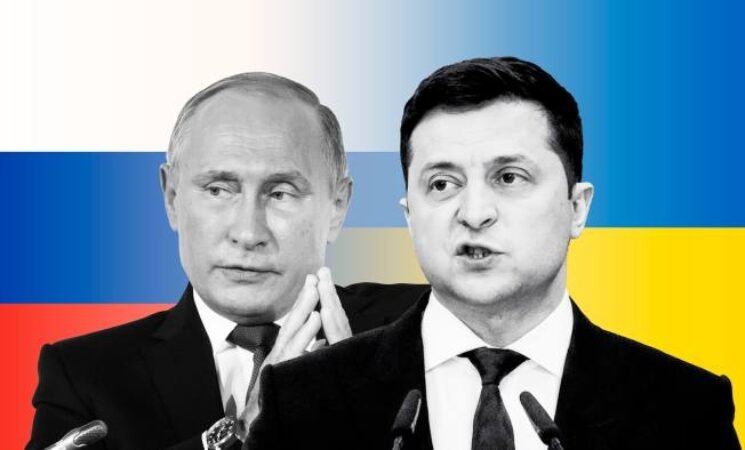24 February 2022, NIICE Commentary 7645
Sunil Kumar Chaudhary
The increasing conflicts between Russia and Ukraine have made a massive impact on the global economy at the moment. The immediate global implications will be higher inflation, lower growth, and some disruption to financial markets. Putting aside the very real human cost, war has also serious economic costs – damage to infrastructure, a decline in the working population, inflation, shortages, uncertainty, a rise in debt, and disruption to normal economic activity. In many circumstances, war can lead to inflation – which leads to loss of people’s savings, rise in uncertainty, and loss of confidence in the financial system. War can often lead to higher prices of oil because major conflict can threaten supplies.
 The Russian invasion of Ukraine led to a rise in the price of oil and gas, and this will lead to higher global prices for fuel. As Russia is a major supplier of oil and gas, economic sanctions on Russia in response to the invasion will reduce supply and put upward pressure on oil prices. Thus, the Nepalese household is likely to bear the brunt of escalating Russia-Ukraine crisis. Tension in the European region is likely to drive commodity and food prices higher. However, Nepal’s direct economic relations with Russia and Eastern Europe are very low. Due to its low economic cooperation, the direct effect will be less noticeable. According to the International Monetary Fund’s Direction of trade statistics (DOTS) Nepal imported about USD 8.24 million and exported USD 2.01 million worth of goods in 2020 from Russia whereas, from Ukraine, Nepal imported USD 202.92 million and exported USD 0.02 million. If we look at Russia’s direct investment as of 15 July 2020, NRs. 694 million Foreign Direct Investment (FDI) has been received from Russia which is invested in 42 different companies and they have generated 1464 jobs. These numbers are small; therefore, it doesn’t matter in the context of the economy. Thus, the conflict may have a minimal direct effect on the Nepalese economy.
The Russian invasion of Ukraine led to a rise in the price of oil and gas, and this will lead to higher global prices for fuel. As Russia is a major supplier of oil and gas, economic sanctions on Russia in response to the invasion will reduce supply and put upward pressure on oil prices. Thus, the Nepalese household is likely to bear the brunt of escalating Russia-Ukraine crisis. Tension in the European region is likely to drive commodity and food prices higher. However, Nepal’s direct economic relations with Russia and Eastern Europe are very low. Due to its low economic cooperation, the direct effect will be less noticeable. According to the International Monetary Fund’s Direction of trade statistics (DOTS) Nepal imported about USD 8.24 million and exported USD 2.01 million worth of goods in 2020 from Russia whereas, from Ukraine, Nepal imported USD 202.92 million and exported USD 0.02 million. If we look at Russia’s direct investment as of 15 July 2020, NRs. 694 million Foreign Direct Investment (FDI) has been received from Russia which is invested in 42 different companies and they have generated 1464 jobs. These numbers are small; therefore, it doesn’t matter in the context of the economy. Thus, the conflict may have a minimal direct effect on the Nepalese economy.
However, after Russia invaded Ukraine, oil prices in Europe and international markets have reached a seven-year high. Even if there is no direct effect, there will be an indirect effect. The biggest indirect impact comes from oil. Russia is a major player in the international oil market, supplying about 10.5 million barrels of oil a day. That is more than 11 percent of the global supply. It is natural for the price of oil to rise as soon as destruction occurs. Oil imports to Nepal were worth Rs 175 billion last year when the price was USD 40-42 per barrel and reached a maximum of USD 75 per barrel. On average, it was USD 60, but now it is over USD 100. In this context, it seems that an additional burden of Rs 100 billion will fall on Nepal’s oil imports which will be an indirect effect on Nepal’s economy.
On the other hand, the direct effect of the declaration of war is that the United States and the North Atlantic Treaty Organization (NATO) members would spend money to support the war, which would reduce the amount of development assistance that Nepal was provided through the Development Corporations. Due to the war, financial development assistance to Nepal may decrease in the future.
Another impact of this war would be that it would affect the global supply chain. If we look at Nepal’s economy, it is an economy that is dependent on imports. More than 40 percent of Nepal’s consumption demand constitutes imports. The impact of war will affect the global supply chain and consequently the global prices, which will eventually affect Nepal’s economy. The major impact would be through inflation and the scourge of inflation would affect the poor. Similarly, the Russia-Ukraine crisis could impact the food prices in Nepal and the sharp jump in crude oil prices will pose inflationary, fiscal risks to the economy.
In order to minimize its impact on the Nepalese economy, Nepal should focus on the following areas: reduce the unnecessary use of petroleum products and promote hydropower. There is also a need to strengthen economic diplomacy more effectively so that the development assistance from the developed country will not be affected. Moreover, to reduce inflationary pressure on the market, monetary and fiscal policies instruments should be implemented properly. For instance, in the fiscal policy instrument such as cut the excise duty and value-added tax (VAT) on fuel prices.
Sunil Kumar Chaudhary is Research Associate at NIICE.

